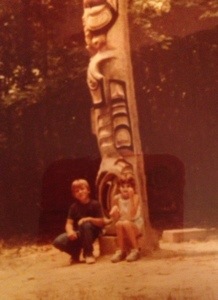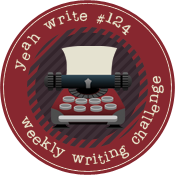You might not believe it, considering that I now live in the Midwest, in flat Plains territory, where my kids think that the sledding hill is a mountain. Oh, they have no clue.
Way back when, before the kids were in the picture, Geoff convinced me to move to a log home on top of a mountain. We lived in Virginia back then, where there are a few respectable mountains. We had some friends who lived on top of one of them. The first time we visited them was an initiation. We grew up in suburbia. I, for one, had never seen a switchback. Have you? Well, that first time, armed with our friends’ instructions, Geoff finally got to test out the low-four-wheel drive on our new SUV. He was psyched. I was scared – no, terrified – on the way up, and I threatened to get out of the car. But we made it up the four switchbacks, found our friends’ beautiful house, and spent the afternoon admiring the view of the fields below.
Then it came time to leave. Going down the mountain frightened me even more than driving up. We literally could not see the road in front of the car. I’m pretty sure that I kept my eyes closed the whole way down. By the time we reached the main road I was glad that it was all over.
Less than a year later, we bought the house across the road from our friends. We made the decision to move impetuously, for us. We sold our townhouse and bought a log home, and the whole thing happened in just a few weeks. It’s a blur, but I remember that Geoff wanted it and I wanted it for him. I wanted it for us. It was the beginning of a six-year-long adventure.
That first day, that afternoon when I followed the moving truck from tidy suburbia past the horse farms, past all signs of civilization, to our new home in the woods, I took a deep breath as I reached the bottom of the mountain. I was scared but I did it anyway. I can clearly remember the adrenaline rushing through my body as I steered the car up those switchbacks. I reached the mostly flat gravel road at the top. I drove slowly, the view my prize for risking my life. Then, just like that, I was home.
We lived in that home until our daughter turned one. I drove up and down the mountain hundreds of times. Yet I never got used to it. For years, as I drove the winding road leading to those switchbacks, my heart would race. Every single time those switchbacks made me nervous. Every day the mountain was new to me.


Thanks, Samantha, for inspiring me last week with your post about adjusting to change.













